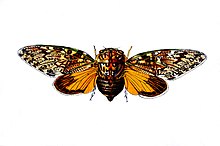
The cicadas are a superfamily, the Cicadoidea, of insects in the order Hemiptera. They are in the suborder Auchenorrhyncha, along with smaller jumping bugs such as leafhoppers and froghoppers. The superfamily is divided into two families, the Tettigarctidae, with two species in Australia, and the Cicadidae, with more than 3,000 species described from around the world; many species remain undescribed.
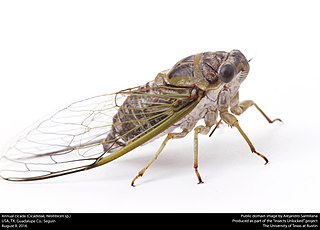
Cicadidae, the true cicadas, is the largest family of cicadas, with more than 3,200 species worldwide. The oldest known definitive fossils are from the Paleocene, a nymph from the Cretaceous Burmese amber has been attributed to the family, but could also belong to the Tettigarctidae.

The Cicadinae are a subfamily of cicadas, containing the translucent cicadas. They are robust cicadas and many have gaudy colors, but they generally lack the butterfly-like opaque wing markings found in many species of the related Tibiceninae.

Platypleura is a genus of cicadas that occurs widely across Africa and southern Asia. Some of the South African species are remarkable for their endothermic thermoregulation that enables crepuscular signalling, an adaptation that reduces risk of predation and enables a greater range for their calls. In field experiments their maximum body temperature while calling at dusk, was measured at 22 °C above ambient temperature.
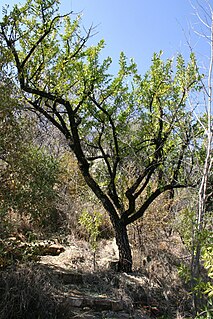
Gymnosporia heterophylla, the common spike-thorn, is a small, hardy, deciduous African tree up to 5m tall, occurring in rocky places with a wide distribution from Ethiopia, the Sudan and the Congo, south to the Cape Province and west to Angola and Namibia, as well as the neighbouring islands of Madagascar and Saint Helena, with a closely related species from Mauritius.

The Platypleurini are a tribe of cicadas from the Afrotropical and Oriental regions There are at least 30 genera and 240 described species in Platypleurini.

Platypleura mijburghi is a medium-sized cicada species, that is native to South Africa. It has been recorded in Gauteng, Mpumalanga and the Northern Province. The adults are active from October to January.
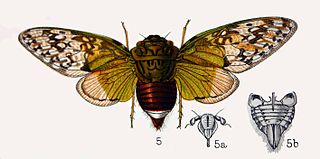
Pycna semiclara, known as the Whining Forest Cicada, is a South African forest-dwelling platypleurine cicada.

Carinetini is a tribe of cicadas in the family Cicadidae, found in the neotropics. There are about 7 genera and at least 90 described species in Carinetini.
Karenia is a genus of cicadas in the family Cicadidae, found in Asia and Indomalaya. There are about six described species in Karenia.

Stagira is a genus of cicadas in the family Cicadidae. There are at least 30 described species in Stagira.

Tettigomyiinae is a subfamily of cicadas in the family Cicadidae, found in tropical Africa. There are about 16 genera and at least 100 described species in Tettigomyiinae.
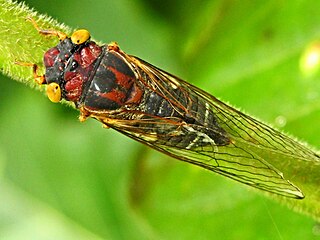
Lamotialnini is a tribe of cicadas in the family Cicadidae. There are about 19 genera and at least 90 described species in Lamotialnini, occurring worldwide except South America.
Pictilini is a tribe of cicadas in the family Cicadidae, found in Australia. There are at least two genera and two described species in Pictilini.

Cosmopsaltriini is a tribe of cicadas in the family Cicadidae. There are at least 90 described species in Cosmopsaltriini, found in southeast Asia, Australasia, and Oceania.
Nelcyndana is a genus of cicadas in the family Cicadidae, found in southeast Asia and the Philippines. There are about five described species in Nelcyndana.

Macrotristriini is a tribe of cicadas in the family Cicadidae. There are at least 2 genera and 20 described species in Macrotristriini, all found in Australia.

Oncotympanini is a tribe of cicadas in the family Cicadidae, found in China and southeast Asia. There are at least 3 genera and about 12 described species in Oncotympanini.

Malagasiini is a tribe of cicadas in the family Cicadidae, found in Africa and Madagascar. There are about 5 genera and at least 20 described species in Malagasiini.
Tettigomyiini is a tribe of cicadas in the family Cicadidae, found in Africa and Madagascar. There are about 8 genera and at least 60 described species in Tettigomyiini.
